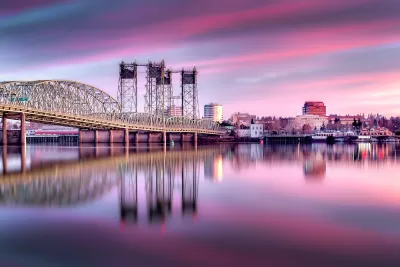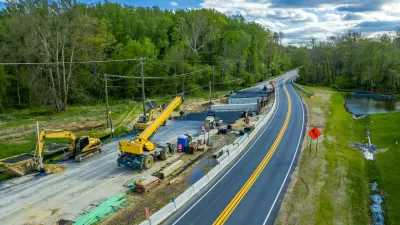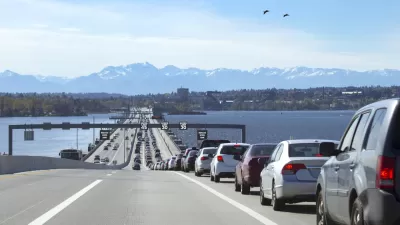The environmental impact report for a massive highway project in the Pacific Northwest ignores the reality of induced demand.

A $7.5-billion highway expansion project in the Pacific Northwest is in “deep denial,” writes Ryan Packer in The Urbanist, noting that the proposed widening of Interstate 5 and replacement of the Columbia Bridge between Washington and Oregon ignore the well-proven concept of induced demand.
As Packer explains, “After months of delay, the IBR team has finally released its draft environmental review, one of the biggest hurdles left to clear before it can start construction, still targeted for sometime in 2026.”
The project is the largest in Pacific Northwest history and will add two “auxiliary” lanes, rebuild seven interchanges, and extend light rail into Vancouver, Washington. “However, the shiny new document leaves out an essential consideration when it comes to projecting the future effects of I-5 expansion in this long-constrained corridor, an omission that would have been much less noticed in a decade ago but which sticks out like a sore thumb now.”
For Packer, the project is another example of archaic thinking that prioritizes cars and will ultimately create more traffic. “To present the IBR as a climate win, the project team is framing a 23% increase in total traffic as resulting in a net reduction in emissions largely because of a broader transition to electric vehicles that is wholly outside the project’s control. But they also cite a reduction in stop-and-go traffic as leading to future emissions reductions, another myth has has been fully refuted for years.”
FULL STORY: Pacific Northwest’s Largest Highway Project Ever Is in Deep Denial

Planetizen Federal Action Tracker
A weekly monitor of how Trump’s orders and actions are impacting planners and planning in America.

Congressman Proposes Bill to Rename DC Metro “Trump Train”
The Make Autorail Great Again Act would withhold federal funding to the system until the Washington Metropolitan Area Transit Authority (WMATA), rebrands as the Washington Metropolitan Authority for Greater Access (WMAGA).

The Simple Legislative Tool Transforming Vacant Downtowns
In California, Michigan and Georgia, an easy win is bringing dollars — and delight — back to city centers.

In These Cities, Most New Housing is Under 441 Square Feet
With loosened restrictions on “micro-housing,” tiny units now make up as much as 66% of newly constructed housing.

Albuquerque’s Microtransit: A Planner’s Answer to Food Access Gaps
New microtransit vans in Albuquerque aim to close food access gaps by linking low-income areas to grocery stores, cutting travel times by 30 percent and offering planners a scalable model for equity-focused transit.

This City Will Pay You to Meet Your Neighbors
A North Kansas City grant program offers up to $400 for residents to throw neighborhood block parties.
Urban Design for Planners 1: Software Tools
This six-course series explores essential urban design concepts using open source software and equips planners with the tools they need to participate fully in the urban design process.
Planning for Universal Design
Learn the tools for implementing Universal Design in planning regulations.
Smith Gee Studio
City of Charlotte
City of Camden Redevelopment Agency
City of Astoria
Transportation Research & Education Center (TREC) at Portland State University
US High Speed Rail Association
City of Camden Redevelopment Agency
Municipality of Princeton (NJ)





























